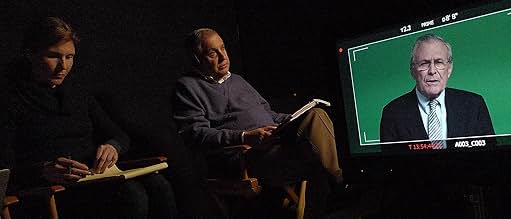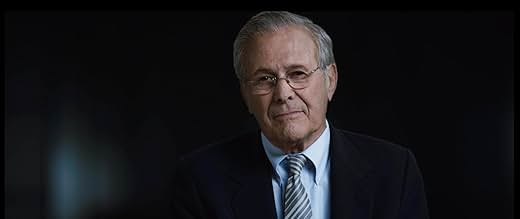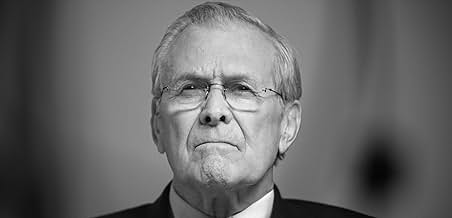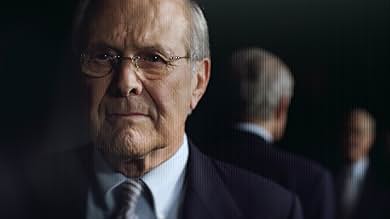The Unknown Known - Die Agenda des Donald Rumsfeld
Originaltitel: The Unknown Known
IMDb-BEWERTUNG
7,0/10
4371
IHRE BEWERTUNG
Füge eine Handlung in deiner Sprache hinzuFormer United States Secretary of Defense, Donald Rumsfeld, discusses his career in Washington D.C. from his days as a congressman in the early 1960s to planning the invasion of Iraq in 2003... Alles lesenFormer United States Secretary of Defense, Donald Rumsfeld, discusses his career in Washington D.C. from his days as a congressman in the early 1960s to planning the invasion of Iraq in 2003.Former United States Secretary of Defense, Donald Rumsfeld, discusses his career in Washington D.C. from his days as a congressman in the early 1960s to planning the invasion of Iraq in 2003.
- Regie
- Drehbuch
- Hauptbesetzung
- Auszeichnungen
- 2 Gewinne & 10 Nominierungen insgesamt
Errol Morris
- Self - Interviewer
- (Synchronisation)
Empfohlene Bewertungen
Having very much enjoyed the similarly framed Fog Of War, I was of course very curious to see Donald Rumsfeld undergo the same sort of film since in his case his actions have been very much within my lifetime but of course most relevantly in the post-9/11 world. I recall that his frequent ducking and diving with the press during Afghanistan and Iraq saw him to be very nimble on his feet but also prone to flat out denial of things that certainly appeared to be true unless you took an absolute stand on the very specific point of definition. The film starts with Rumsfeld's love of the memo, of which thousands exist, and we jump back through his political career, with the first hour spent pre-Bus administration before the second half circles back very much to the 00's and his role as Defense Secretary.
In terms of the ground it covers, the film is inherently interesting and it does at least provide a concise walk through things, with the odd aspect that I was not fully aware. It achieves this not because the film is really interesting, but just because it covers the events and these in themselves are interesting. It helps to understand the players (as many will) but not too much, since the film really will do little for those that know the subject inside out. In terms of the type of reflection and investigation of Fog of War, forget it, none is here and Rumsfeld has no intention of straying from the line he has walked thus far. This makes the film ultimately disappointing – not because I wanted the film to "get him" or reveal him, but just because there is really nothing here to add to the hours of cspan and controlled statements over the past decade.
If the film could be said to reveal anything, it is that it reveals the steadfastness and the unwillingness to publicly reflect of Rumsfeld – he grins his way through the film, providing unconvincing defenses of anything put to him and quick to argue even on things about the specific meaning of his "known unknowns" speech. It is a great performance in that regard and the film only reveals how deep entrenched it is. Is this a surprise though? Is it enough to really consider enough to justify the film to find that a man who is a career politician is very good at politics? I think not and ultimately, although the focus of the film inherently provides material of interest, it does little to add to it or to get anywhere that could be said to revealing, insightful or to have made this specific film worthwhile.
In terms of the ground it covers, the film is inherently interesting and it does at least provide a concise walk through things, with the odd aspect that I was not fully aware. It achieves this not because the film is really interesting, but just because it covers the events and these in themselves are interesting. It helps to understand the players (as many will) but not too much, since the film really will do little for those that know the subject inside out. In terms of the type of reflection and investigation of Fog of War, forget it, none is here and Rumsfeld has no intention of straying from the line he has walked thus far. This makes the film ultimately disappointing – not because I wanted the film to "get him" or reveal him, but just because there is really nothing here to add to the hours of cspan and controlled statements over the past decade.
If the film could be said to reveal anything, it is that it reveals the steadfastness and the unwillingness to publicly reflect of Rumsfeld – he grins his way through the film, providing unconvincing defenses of anything put to him and quick to argue even on things about the specific meaning of his "known unknowns" speech. It is a great performance in that regard and the film only reveals how deep entrenched it is. Is this a surprise though? Is it enough to really consider enough to justify the film to find that a man who is a career politician is very good at politics? I think not and ultimately, although the focus of the film inherently provides material of interest, it does little to add to it or to get anywhere that could be said to revealing, insightful or to have made this specific film worthwhile.
Donald Rumsfeld, The Unknown Known, and his Lifetime of Service to War
The Unknown Known is the latest documentary from Errol Morris. Like his interviews with Robert McNamara in his film Fog of War, he interviews another architect of war, this time the Second Iraq War.
Unlike former Secretary of Defense Robert McNamara who pushed a continuation of the Vietnam conflict when he was in office, Donald Rumsfeld is not apologetic about his role in sending Americans off to die overseas. In his book In Retrospect, McNamara states in Time Magazine, "We were wrong, terribly wrong. We owe it to future generations to explain why."
Rumsfeld has no apologies to make, according to the man himself. And he learned no lesson from Vietnam except, as he would say, "it was a failure of imagination" that we lost in Vietnam.
Even Nixon apologized about his mistakes when talking to David Frost.
I am sure Director Morris was under legal contract not to ask tough, direct questions of Rumsfeld. Thus, he let Rumsfeld indict himself. Rumsfeld is narcissistic and unapologetic about the Second Iraq War. He sees no wrong in making the U.S. strong militarily regardless in how that strength is used. He does not, in The Unknown Known, see that the Second Iraq War was based on lies at all. He sees no lies. He submits that Saddam Hussein and Iraq did have WMDs, we just couldn't find them. He believes the U.N. weapons inspectors were duped and needed to keep looking. He does not agree that water boarding is torture, no matter what Human Rights Watch and others say. He sees know wrong except in our "failure of imagination."
Rumsfeld is a master of Newspeak, using phrases like "peace through strength", and "weakness is provocation." This all comes out in the movie, and it was no surprise to most of the audience. He lives in a world of lies, and the person he deludes the most is himself. Rating: Rent it. It is worth a view, and I would love to say that you should see it multiple times.
But there are no dramatic revelations in the movie, no sense of awaking. In fact, the lesson is that a beltway insider has many ways to deny the suffering of others, especially those we kill thousands of miles away for no cause. Rumsfeld sees war not as a destination, but a journey. As long as the U.S. stays on that journey, he is happy.
Peace, Tex Shelters
The Unknown Known is the latest documentary from Errol Morris. Like his interviews with Robert McNamara in his film Fog of War, he interviews another architect of war, this time the Second Iraq War.
Unlike former Secretary of Defense Robert McNamara who pushed a continuation of the Vietnam conflict when he was in office, Donald Rumsfeld is not apologetic about his role in sending Americans off to die overseas. In his book In Retrospect, McNamara states in Time Magazine, "We were wrong, terribly wrong. We owe it to future generations to explain why."
Rumsfeld has no apologies to make, according to the man himself. And he learned no lesson from Vietnam except, as he would say, "it was a failure of imagination" that we lost in Vietnam.
Even Nixon apologized about his mistakes when talking to David Frost.
I am sure Director Morris was under legal contract not to ask tough, direct questions of Rumsfeld. Thus, he let Rumsfeld indict himself. Rumsfeld is narcissistic and unapologetic about the Second Iraq War. He sees no wrong in making the U.S. strong militarily regardless in how that strength is used. He does not, in The Unknown Known, see that the Second Iraq War was based on lies at all. He sees no lies. He submits that Saddam Hussein and Iraq did have WMDs, we just couldn't find them. He believes the U.N. weapons inspectors were duped and needed to keep looking. He does not agree that water boarding is torture, no matter what Human Rights Watch and others say. He sees know wrong except in our "failure of imagination."
Rumsfeld is a master of Newspeak, using phrases like "peace through strength", and "weakness is provocation." This all comes out in the movie, and it was no surprise to most of the audience. He lives in a world of lies, and the person he deludes the most is himself. Rating: Rent it. It is worth a view, and I would love to say that you should see it multiple times.
But there are no dramatic revelations in the movie, no sense of awaking. In fact, the lesson is that a beltway insider has many ways to deny the suffering of others, especially those we kill thousands of miles away for no cause. Rumsfeld sees war not as a destination, but a journey. As long as the U.S. stays on that journey, he is happy.
Peace, Tex Shelters
"There are known knowns; there are things we know that we know. There are known unknowns; that is to say, there are things that we now know we don't know. But there are also unknown unknowns - there are things we do not know we don't know." This was the enigmatic quote from American politician Donald Rumsfeld that inspired the title of this interview by acclaimed documentary maker Errol Morris. Rumsfeld had an astonishing career working for no fewer than four US presidents and serving twice as Secretary of State for Defense - once as the youngest holder of the position (1975- 1977) and then later as the oldest holder of the post (2001-2006). In his second term as Defense Secretary, he was a principal architect of the so-called 'war on terror', sending troops into Afghanistan and then Iraq.
The fascinating testimony presented by Morris is both written and oral. Rumsfeld was famous for his blizzard of memos - known as "snowflakes" - and Morris managed to gain access to all the unclassified ones and to persuade Rumsfeld to read out the most relevant to the documentary. Additionally Morris posed a series of searching questions in an interview shot over 11 days and recorded using the film maker's trademark "Interrotron" device which means that Rumsfeld is seen staring straight into the camera. It has to be said that Rumsfeld is a fluent writer and an articulate speaker and, after eight decades, is as sharp as ever, so there is no revelatory moment like David Frost's interview with Richard Nixon, but it is precisely his evasiveness and the charming manner in which he accomplishes this that is so revealing of a bizarre and (when given power) frightening character.
I saw "The Known Unknown" at its UK premiere in central London's Curzon Soho cinema in the presence of Errol Morris who made some opening remarks and then, after the screening, took a question & answer session. He compared this documentary with "The Fog Of War", his 2003 interview with another US Defense Secretary when he questioned Robert McNamara on the Vietnam war, and called the two films "bookends". He noted that McNamara was "deeply reflective", but characterised Rumsfeld's performance as "deeply unreflective". He called Rumsfeld "a skillful obscurantist" who was "obsessive with language" and had "a complete lack of irony", highlighting his "infernal grin".
The banality of much of Rumsfeld's language - "The absence of evidence is not the evidence of absence" - reminded me of Peter Sellers' penultimate film "Being There" (1979) in which he played a simple gardener whose bland aphorisms about nature led to him being co-opted by America's political power brokers. Morris has done us a service in capturing all this for history in the hope that we can learn from history. What is totally unclear is why Rumsfeld agreed to the interview. This was Morris's last question to him and he responded: "I'll be darned if I know".
The fascinating testimony presented by Morris is both written and oral. Rumsfeld was famous for his blizzard of memos - known as "snowflakes" - and Morris managed to gain access to all the unclassified ones and to persuade Rumsfeld to read out the most relevant to the documentary. Additionally Morris posed a series of searching questions in an interview shot over 11 days and recorded using the film maker's trademark "Interrotron" device which means that Rumsfeld is seen staring straight into the camera. It has to be said that Rumsfeld is a fluent writer and an articulate speaker and, after eight decades, is as sharp as ever, so there is no revelatory moment like David Frost's interview with Richard Nixon, but it is precisely his evasiveness and the charming manner in which he accomplishes this that is so revealing of a bizarre and (when given power) frightening character.
I saw "The Known Unknown" at its UK premiere in central London's Curzon Soho cinema in the presence of Errol Morris who made some opening remarks and then, after the screening, took a question & answer session. He compared this documentary with "The Fog Of War", his 2003 interview with another US Defense Secretary when he questioned Robert McNamara on the Vietnam war, and called the two films "bookends". He noted that McNamara was "deeply reflective", but characterised Rumsfeld's performance as "deeply unreflective". He called Rumsfeld "a skillful obscurantist" who was "obsessive with language" and had "a complete lack of irony", highlighting his "infernal grin".
The banality of much of Rumsfeld's language - "The absence of evidence is not the evidence of absence" - reminded me of Peter Sellers' penultimate film "Being There" (1979) in which he played a simple gardener whose bland aphorisms about nature led to him being co-opted by America's political power brokers. Morris has done us a service in capturing all this for history in the hope that we can learn from history. What is totally unclear is why Rumsfeld agreed to the interview. This was Morris's last question to him and he responded: "I'll be darned if I know".
Errol Morris tackles another former United States Secretary of Defense in Donald Rumsfeld with an in-depth interview. It starts mainly on the invasion of Iraq but covers his entire Washington career and his personal life. The Iraq stuff is not anything new especially if one had paid attention. Rumsfeld is as evasive as ever. His earlier work for previous Presidents holds some interest inside stories. The obvious comparison is Errol Morris' masterpiece "The Fog of War". In that one, Robert McNamara is much less a politician and more of a wise elder lamenting mistakes. That is a much more compelling watch. This one is an extended Sunday morning political talk show and a simple biodoc of Rumsfeld's career. Errol Morris' views are obvious from his questioning. The history is informative but nothing shocking. Maybe in another twenty years, Rumsfeld will have something more interesting and surprising to say.
Famously rigorous filmmaker Errol Morris sits a subject in front of him and the subject won't budge. This is, unfortunately, the takeaway from this documentary - a tremendous disappointment of a film in some way, but an extraordinary documentation of psychosis in another.
Rumsfeld apparently so annoyed Morris with his crafty replies that the director felt it necessary to follow up his film with a wild press tour apologizing for it - including a four part investigation into Rumsfeld's evasiveness in a New York times op-ed. In another article he called this film 'a horror movie'.
And it's understandable. Those who were against the wars in Iraq and Afghanistan will be infuriated- it gives us no new answers as to the motives behind the wars, no candid insights into Rumsfeld's tenure, and instead presents us with the same smirking blur of a man that we all got to know from his press conferences. Without a glint of uncertainty in his eye, he repeats essentially the same shtick as he always has. Direct questions are deflected with a grin and a wave.
Indeed, nobody deserves to be investigated more than Rumsfeld or his former compatriots, and Morris would ordinarily be the man to do it. But for an encounter to take place between two people, both need to be there. In this case one was absent. Those expecting a one on one - a whittling away towards the real substance - will leave empty handed because Rumsfeld is a ghost. There ain't nothing there. We've all been punk'd.
Rumsfeld apparently so annoyed Morris with his crafty replies that the director felt it necessary to follow up his film with a wild press tour apologizing for it - including a four part investigation into Rumsfeld's evasiveness in a New York times op-ed. In another article he called this film 'a horror movie'.
And it's understandable. Those who were against the wars in Iraq and Afghanistan will be infuriated- it gives us no new answers as to the motives behind the wars, no candid insights into Rumsfeld's tenure, and instead presents us with the same smirking blur of a man that we all got to know from his press conferences. Without a glint of uncertainty in his eye, he repeats essentially the same shtick as he always has. Direct questions are deflected with a grin and a wave.
Indeed, nobody deserves to be investigated more than Rumsfeld or his former compatriots, and Morris would ordinarily be the man to do it. But for an encounter to take place between two people, both need to be there. In this case one was absent. Those expecting a one on one - a whittling away towards the real substance - will leave empty handed because Rumsfeld is a ghost. There ain't nothing there. We've all been punk'd.
Wusstest du schon
- WissenswertesThis same director also made Fog of War, a similar film that featured an extensive interview with Vietnam-era Secretary of Defense, Robert McNamara. Both films were highly critical of their lead subjects management of war.
- Crazy CreditsIvan & Boris
- VerbindungenFeatured in At the Movies: Venice Film Festival 2013 (2013)
- SoundtracksWhite Christmas
Written by Irving Berlin
Performed by Tennessee Ernie Ford
Courtesy of Capitol Records Nashville under license from Universal Music Enterprises
Top-Auswahl
Melde dich zum Bewerten an und greife auf die Watchlist für personalisierte Empfehlungen zu.
- How long is The Unknown Known?Powered by Alexa
Details
Box Office
- Bruttoertrag in den USA und Kanada
- 276.497 $
- Eröffnungswochenende in den USA und in Kanada
- 64.315 $
- 6. Apr. 2014
- Weltweiter Bruttoertrag
- 301.604 $
- Laufzeit
- 1 Std. 43 Min.(103 min)
- Farbe
- Sound-Mix
- Seitenverhältnis
- 2.35 : 1
Zu dieser Seite beitragen
Bearbeitung vorschlagen oder fehlenden Inhalt hinzufügen
























